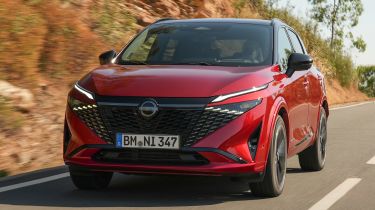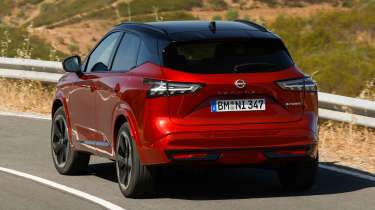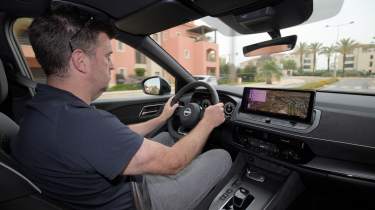Nissan Qashqai e-Power review: clever hybrid is a competent all-rounder
The Nissan Qashqai e-Power's innovative powertrain works well, offering a smooth EV-like driving experience

Verdict
The Nissan Qashqai e-Power is an unusual proposition with its range-extender powertrain but it works well as a package and the 2024 facelift improved things considerably. It’s a case of cosmetic and tech improvements rather than anything more substantial, but these targeted changes are significant. A more distinctive look and a markedly better infotainment system, married to an existing skillset almost devoid of serious shortcomings, means the Qashqai remains a car that can be all things to a whole lot of people - without necessarily trouncing the competition in any one area.
Possibly more than any other car, the Nissan Qashqai has come to represent the SUV’s dramatic transition from a niche off-road utility vehicle to a cornerstone of the mainstream car market. Often credited with originating the ‘crossover’ SUV concept where actual 4x4 capability took a back seat to everyday school run and supermarket practicality, Nissan’s biggest seller became, and remains, one of the UK’s most popular cars. Nissan has sold 750,000 of them in the UK alone.
The elevation of the SUV segment we’ve seen over the last decade has made the Nissan Qashqai’s task a lot harder. While traditional family hatchbacks have waned, the quantity and variety of mid-size SUVs on offer has exploded. The Qashqai has an ongoing battle on its hands to stay at the top, and this mid-life facelift of the third-generation car is designed to beef up its arsenal.
Used - available now

2020 Nissan
Qashqai
19,398 milesManualPetrol1.3L
Cash £12,700
2022 Nissan
Qashqai
15,477 milesManualPetrol1.3L
Cash £14,587
2018 Nissan
Qashqai
19,700 milesAutomaticDiesel1.5L
Cash £16,087
2020 Nissan
Qashqai
18,926 milesAutomaticPetrol1.3L
Cash £15,900The term ‘battle’ is apt here because this updated Qashqai has donned its war paint in the form of a bold new look based around a big grille with a ‘comma’ pattern that overlaps in a way that’s said to be inspired by the scales on Japanese armour. Nissan even goes so far as to describe the body-coloured bar below the new supersize grille as a ‘chin-strap’, evoking a warrior’s protective headgear and underlining that the Sunderland-built family car is ready for a fight.
You’ve also got new, slimline lighting elements on the front end, including a row of daytime running lights that carry on the comma theme. At the rear, there’s no change in the shape of the lights, but the units within have been upgraded and look sharper. With further tweaks to bumpers and trim plus quirky new wheel designs, this is a major overhaul of the Qashqai’s design. We’ll let you make your own judgement on how successful it’s all been aesthetically, but the Qashqai had perhaps begun to look a little dull in the face of more adventurously styled rivals like the Peugeot 3008, Toyota C-HR and the growing band of coupe-SUV contenders. Though you’d be hard-pressed to call it pretty, this more aggressive treatment goes some way to redress the balance.
Materials in the cabin have been upgraded with the new N-Design models getting a lot of plush Alcantara dash, door inserts, and arm rests. Tekna cars have a very classy soft leather finish in the same places and there also some metallic effect plastic around the gear selector.
The bigger news is the suite of Google-based connectivity tech on all bar the entry-level cars. There’s Google Maps, a voice assistant and a range of apps that can be downloaded. You can also sign-in with your Google account so pairing your phone with the car becomes almost unnecessary. For Apple users, there’s wired or wireless Apple CarPlay across the range.
As before, the engine choice is all hybrid, with the core 1.3-litre DiG-T mild-hybrid petrol unit available in two power outputs - 138bhp and 156bhp - then the clever e-Power range extender hybrid topping the lineup with 187bhp. The more powerful mild-hybrid engine is available with all-wheel drive and a choice of six-speed manual or automatic gearboxes, all other Qashqai versions are front-wheel drive only. While the less powerful mild-hybrid is an exclusively manual affair, the e-Power cars use a 1.5-litre three-cylinder engine as a generator to provide electricity for electric motors that drive the wheels, so it doesn’t need gears.
The entry-level manual mild-hybrid cars get 44.8mpg on the official WLTP combined cycle, but this drops slightly as you ascend the trim level range, pile on the equipment, and access the larger (18-, 19- and 20-inch) alloy wheel sizes. The automatic gearbox trumps the manual with a 45.6mpg showing in the base car, and if you go for the e-Power, it’s 54mpg. These are respectable rather than stellar numbers when you consider that the Peugeot 3008 hybrid returns 50mpg and Toyota’s CH-R hybrid tips over the 60mpg barrier. On our drive on a mixed, hilly route in Portugal, we averaged around 39mpg in the Qashqai e-Power.
The e-Power system is certainly an unorthodox one. In some respects, it’s like driving an electric car because it’s purely the electric motor that’s turning the wheels. The power delivery is linear and smooth, with none of the hesitancy that can afflict conventional hybrid cars as they switch between petrol and electric drive. It doesn't have the instant acceleration of an electric car, though.
The 0-62mph sprint takes a respectable 7.9 seconds, but unless you're willing to keep the throttle pinned and wait for the power to arrive - the 187bhp maximum is served between 4,500 and 7,500rpm - it can feel more weedy than those numbers, and the 330Nm torque output, might suggest.
The ride is generally very comfortable. The Portuguese roads were much smoother than the UK equivalents, but nothing on our test route exposed any real harshness in the suspension of our test car. Like all N-Design and Tekna+ models, it was rolling around on 20-inch wheels but also had independent rear suspension instead of the less sophisticated beam setup on other Qashqais. On these big rims, the Qashqai can get unsettled by rough patches and bumps, especially mid-corner, but it remains one of the more cosseting mid-size SUVs in everyday driving.
The Qashqai will never challenge the most enjoyable SUVs of this size, think SEAT Ateca or MINI Countryman, for driving fun. It should, however, have enough poise and alacrity to keep most buyers happy.
Refinement is very good. If you can resist the urge to hold the throttle down, the engine is all but inaudible. Wind and road noise don’t do much to break the silence, either. The rough growl of the three-cylinder motor does get frantic when you accelerate hard, and it's not a sound that petrolheads will be queuing up to listen to for pleasure.
In terms of practicality, the Nissan Qashqai doesn’t shine as brightly as the best cars of its type but doesn’t disgrace itself either. Like so much about the Qashqai, the 504-litre boot is competitive for the class. There’s a bit of a load lip in that configuration, but the luggage boards on higher spec cars deliver a flat floor with a compartment beneath and a 479-litre capacity. You can also mount the boards vertically to segment the boot area, which is a nice touch if you need to stop your shopping getting crushed. Fold the rear seats down and there’s 1,447 litres to play with.
The Nissan Qashqai retains its relatively broad trim level range with Acenta Premium, N-Connecta, N-Design, Tekna and Tekna+ variants for buyers to consider. However, the old Visa trim level is gone, pushing the starting price north to just over £30,000.
| Model: | Nissan Qashqai N-Design e-Power |
| Price: | £39,620 |
| Engine: | 1.5-litre 3cyl petrol, 1 x e-motor |
| Power/torque: | 187bhp/330Nm |
| Transmission: | Single speed, front-wheel drive |
| 0-62mph: | 7.9 seconds |
| Top speed: | 105mph |
| MPG/CO2: | 54.3mpg/117g/km |
| On sale: | Now |










